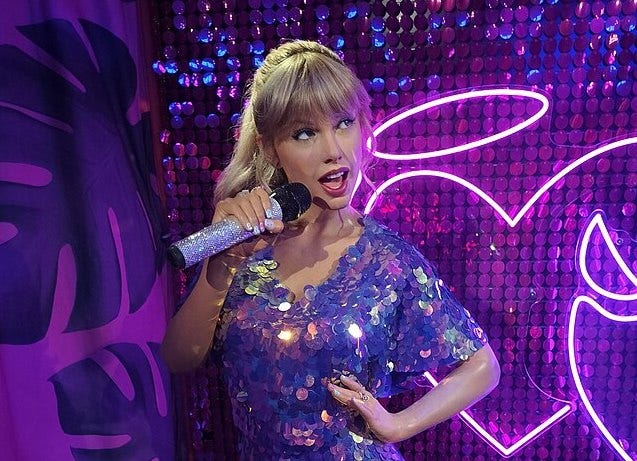Someday in our dotage we will tell stories of that legendary era known as “Peak T.V.” We’ll do it the way ex-hippies talk now about Woodstock: “It was wild, man, there were legends on every streamer. A thousand flowers bloomed. The lady from Fleabag ended up in Indiana Jones! You couldn’t go on Twitter until you knew whether Logan Roy had died that week.”
“What’s Twitter,” our grandkids will reply, looking at us with indulgent condescension through the holo-lens they’ve grafted onto our retinas. Which will have an effect on us not unlike that produced by asking an aging vet, “what happened in ’Nam?”
But no maundering geriatric retrospective on this fleeting micro-era would be complete without reference to the rise of the anti-hero: the Walter Whites and Tony Sopranos, the Dexters and the Don Drapers. Those apex predators whose charisma made us hate ourselves for loving them, whose raw violence and cunning mingled queasily with their charm. For a brief moment, we couldn’t look away.
We were obsessed with anti-heroes because they allowed us to confront something we had been forced to deny: the attractiveness of sheer vitality. Walter White started out Breaking Bad as a law-abiding dweeb, smothered by his wife and trod upon by his students. He broke no rules—he also made no noise.
When he became a drug kingpin in the hyper-macho world of meth-heads and gangsters, we had to acknowledge something very uncomfortable: he had become more evil, but he had also become more worth reckoning with. He had regained some essential force within him, something that had grown soggy and limp in the lukewarm bath of quiet modern life.
Walter poured that energy and drive into becoming a contemptible sleazebag. But the energy was still there, and it had been fundamentally missing before. We couldn’t respect him without it. We couldn’t quite respect him with it, either—but that was because of what he did with it. Even so, even though his manly fortitude was being bent to evil ends, we had to acknowledge it. And where else could it go?
That’s what the show was asking, ultimately: what healthy outlet does our culture offer for the raw force of manliness? What the Greeks called thumos, the source in the soul of war-cries and noble fury, seat of rage and honor…what is its role today? When Gillette put out its infamous ad deploring the excesses of male violence, it conveyed a message that many boys felt they were already hearing everywhere they went: aggression is savagery. “Toxic” masculinity just is masculinity. Don’t fight back; don’t play with guns; don’t get too loud. Who knows what might happen if you do?
The result was predictable. If unfettered violence is the only outlet for manhood, then no small number of men will choose unfettered violence rather than give up their manhood. This is how you get the Andrew Tates of the world, flexing next to their Lamborghinis, talking about women (and apparently, treating them) like farm animals. And so we end up trapped between two extremes: the hyper-softened culture of perpetual kindergarten, and the chest-thumping manosphere of the defiant boor.
The anti-hero really is anti: he is a reaction against the suffocating confines of a World Gone Nice. Shakespeare’s Shylock, condemned as a Jew to occupy only those roles that no Christian would touch, felt he had no choice but to embrace villainy: “Thou call’dst me dog before thou hadst a cause, / But since I am a dog, beware my fangs” (The Merchant of Venice Act III, scene iii).
That is understandable. But it’s not freedom. Because the twisted punchline of the anti-hero’s journey is that he hasn’t really escaped the cloying embrace of the world he lashes out against. He’s always trapped in reaction against it, always trying to prove how triumphant he is over it. His enemy is never off his mind. You can see this kind of self-own happening in real time when young men brag that they’ve outsmarted marriage, that getting tied down with a woman is for chumps. Okay, kid: where does that get you? You’re a rebel—are you happy? You know what to say no to. Do you know how to say yes?
In the Prince (ch.8), Machiavelli broods uneasily over the figure of Agathocles, the Sicilian tyrant who rose to power by slaughtering hundreds of his predecessors. No one could deny, wrote Machiavelli, that Agathocles showed a certain “virtù of both mind and body”: he had that vitality, that daring and decisiveness that makes the world take notice. He even beat back the formidable Carthaginian empire—though in doing so he spat on his former allegiances and trampled over every known bond of honor. Was this virtue? If not, what was it?
In the last analysis, wrote Machiavelli, “it cannot be called virtù to slay fellow-citizens, to deceive friends, to be without faith, without mercy, without religion. Such methods may gain empire, but not glory.” Maybe he showed the raw materials of greatness in the evil things he did. But the greatness and the evil were separate things—and glory comes from separating the one out from the other.
As the scholar Taylor Swift has recently informed us, it gets exhausting always rooting for the anti-hero. The man of sheer strength is a force to be reckoned with. But the man of real moral courage is a lion tamer, strong enough not simply to tear down a broken world but to build something altogether different in its place. A life lived in rebellion against what’s wrong is a life spent trapped in the grip of everything you despise. The anti-hero wields a certain power. But only the hero is free.
Rejoice evermore,
Spencer




